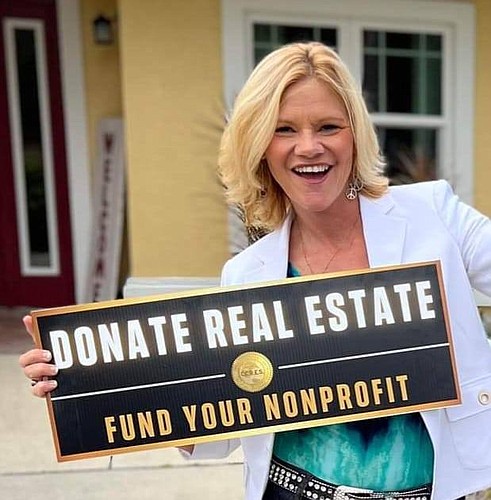- December 25, 2024
-
-
Loading

Loading

Realtor and author Cami Baker is crisscrossing Florida in an RV with her fiancé and their rescue dog, Raven, a German shepherd/Labrador mix. But this is no ordinary post-pandemic, get-out-of-town journey others have embarked on with increasing frequency.
Baker, instead, is on a mission to shine a spotlight on something in real estate and philanthropy that, despite being around for more than 100 years, is rather unknown and underused. The concept? Donating real estate to a nonprofit through the sale listing, also called a legacy listing.
“The old-fashioned way of charitable giving is just sell (the house) and give some of the money to nonprofits,” Baker says. “But that’s irresponsible.”
Baker recently published a book, “Real Estate is Hot, Fundraising is Not,” which details the how and why particulars of the niche and a path to be more responsible. She’s promoting the book and the related business through a Florida tour, which she kicked off June 16 at the Haven in Sarasota. The nonprofit offers programs and services for adults and children with disabilities to enhance quality of life and independence.
Upcoming book tour stops in the RV, a 2018 Chateau Thor, include The Villages and Orlando. Baker, who has been on NBC and Fox for her efforts in educating real estate agents on how to be more charitable, also teaches a class for Realtors on legacy listings. Baker is also promoting the book through podcasts.
In an interview before the book launch, Baker says she researched legacy listings during the height of the pandemic while working and living in New Hampshire. She was looking for something to differentiate herself in a crowded marketplace. “I did all the fundraisers people in real estate do,” she says. “I did all the golf tournaments, car shows and bake sales.”
Baker says she quickly discovered why many — brokers and nonprofit leaders — shy away from it. Nonprofits have long assumed real estate listing gifts are too much "work" to accept, she says. “It’s complicated. It’s risky,” Baker adds. “What if you take title and can’t sell it? There’s a lot to think about.”
Yet the benefits, says Baker, are big. It can help nonprofits grow endowments faster and wider by tapping into existing donors’ “wealth bucket,” not their “income bucket.” It also has the potential to dramatically increase the amount of giving, she says.
For the property owner, and by extension the real estate broker who stands to make a commission of the sale, there are other benefits. Gifting property can help the seller defray or avoid capital gains taxes from appreciated real estate, for example. The owner of a gifted property can also qualify for a tax deduction against adjusted gross income based on current appraised value.
Finally, there’s something the IRS calls a bargain sale, Baker says. “Did you just inherit Mom’s condo but want to sell it? You can even keep most of the cash from the sale,” she writes, “and gift $50,000 to your favorite cause and still receive these tax benefits while keeping most of the cash in your pocket.”
A Key West native, Baker relocated from New Hampshire to the Sarasota-Bradenton area in the pandemic, looking for a lifestyle change and a place to promote legacy listings and her book. Knowing Florida has plenty of both real estate and nonprofits — there are 200,000 Realtors in the state and 160,000 nonprofits, she says — also helped drive her Sunshine State relocation decision.
Baker, behind her book and class, is optimistic legacy listings in real estate will take off. “People have a lot of misconceptions of what this is. What we do is education, information and certification,” she says. “This can work for any size house and for any nonprofit.”